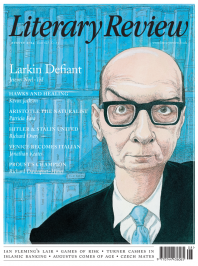Norman Stone
Building Mitteleuropa
Ring of Steel: Germany and Austria-Hungary at War, 1914–1918
By Alexander Watson
Allen Lane/The Penguin Press 787pp £30
There is a spectral presence in today’s Europe and it comes from the world of this book. When the Soviet Union broke up, its western regions saw the revival of states first brought into being by Germany almost a hundred years ago. On 3 March 1918, the Central Powers forced the Russians to sign the Treaty of Brest-Litovsk and recognise the German satellite states established on the richest quarter of European Russia. From Finland, helped into independence by General von der Goltz, to Georgia, where Graf von der Schulenburg established a nationalist army, a new German empire was developing. The essential part was Ukraine, forty-million strong and rich in minerals.
The treaty was not a success. The Germans are not very good at taking over other people’s countries. Nonetheless, there was a coherent programme in eastern Europe. In 1915 Friedrich Naumann, a well-known, honest and well-intentioned liberal, wrote a book entitled Mitteleuropa, which became a wartime bestseller. It set out the programme: a sort of Germanic commonwealth, with free trade between Berlin and points east, as far as Baghdad. German industry would slip in alongside Austrian banks and everyone else’s agriculture. In May 1918 in Budapest there was a gathering of

Sign Up to our newsletter
Receive free articles, highlights from the archive, news, details of prizes, and much more.@Lit_Review
Follow Literary Review on Twitter
Twitter Feed
The latest volume of T S Eliot’s letters, covering 1942–44, reveals a constant stream of correspondence. By contrast, his poetic output was negligible.
Robert Crawford ponders if Eliot the poet was beginning to be left behind.
Robert Crawford - Advice to Poets
Robert Crawford: Advice to Poets - The Letters of T S Eliot, Volume 10: 1942–1944 by Valerie Eliot & John Haffenden (edd)
literaryreview.co.uk
What a treat to see CLODIA @Lit_Review this holiday!
"[Boin] has succeeded in embedding Clodia in a much less hostile environment than the one in which she found herself in Ciceronian Rome. She emerges as intelligent, lively, decisive and strong-willed.”
Daisy Dunn - O, Lesbia!
Daisy Dunn: O, Lesbia! - Clodia of Rome: Champion of the Republic by Douglas Boin
literaryreview.co.uk
‘A fascinating mixture of travelogue, micro-history and personal reflection.’
Read the review of @Civil_War_Spain’s Travels Through the Spanish Civil War in @Lit_Review👇
John Foot - Grave Matters
John Foot: Grave Matters - Travels Through the Spanish Civil War by Nick Lloyd; El Generalísimo: Franco – Power...
literaryreview.co.uk